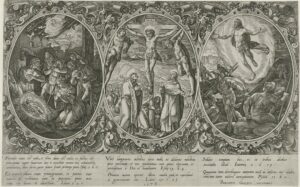Cut the Bible anywhere, and it will bleed. The blood of Jesus stains every page.
—Adrian Rogers1—
Key point: Old Testament prophecies of Jesus’ resurrection demonstrate that God had one plan and one plan only to rescue sinners from hell. He had no alternative plan, no “plan B.” His plan was Jesus, and from the beginning, it included Jesus’ substitutionary sacrifice on the cross and His resurrection from the dead. We can see this clearly in the Old Testament.
Last time we examined Luke’s account of the post-resurection appearances of Jesus to the two disciples on the road to Emmaus and then to a larger group of His followers that included the apostles. Discovering that Jesus’ tomb was empty, the women who made their way to it early Sunday morning after Jesus died on the previous Friday (a Passover) were stunned.

The men with whom they shared their discovery were equally amazed. No one expected Jesus to rise from the dead. Yet, Scripture, which, at the time, consisted only of the Old Testament, accurately had foretold what had occurred. Pointing to Scripture, Jesus admonished, instructed, and enlightened His followers. Here’s a quick review from the discussion we had last time.
- First, He gently rebuked the two with whom He was traveling to Emmaus for not readily believing that the prophets’ words about Him were destined to be fulfilled, and He challenged the second group, asking, “Why are you troubled? And why do doubts arise in your hearts?” His gentle admonitions, however, came with reassurances (see Luke 24:25-26; also see vv. 36-43);
- Second, Jesus “expounded to them in all the Scriptures” (Luke 24:27, also see vv. 44,45,46).
- Third, He “expounded to them in all the Scriptures the things concerning Himself” (v. 27, also see v. 44).
- Fourth, “the things concerning Himself” included His resurrection (see v. 46). While we aren’t told specifically what Scriptures Jesus cited, it isn’t difficult to list numerous passages to which He might have referred. One of these is Jonah 1:17, which powerfully envisions Jesus’ resurrection. Jesus Himself pointed to this passage and to the experience of Jonah himself as illustrative of His — Jesus’ — own death, burial, and return to life.
Picking up where we left off, let’s continue.
Fifth, during His ministry, as He taught His disciples, Jesus echoed the teachings of the Scriptures about Himself (see v. 44). In relation to His death, on at least three occasions, He spoke directly to His disciples about His upcoming crucifixion and the events that would surround it. These events, of course, included His resurrection. We see each instance in all three of the synoptic Gospels (Matthew, Mark, and Luke).
-
- The first incident occurred in Matthew 16:13-23, Mark 8:27-33, and Luke 9:18-22,
- the second in Matthew 17:22-23, Mark 9:30-32, and Luke 9:43-45, and
- the third in Matthew 20:17-19, Mark 10:32-34, and Luke 18:31-34.3
Significantly, in the third instance, in Luke 18:31-34, Luke records that Jesus “took the twelve aside and said to them, ‘Behold, we are going up to Jerusalem, and all things that are written by the prophets concerning the Son of Man will be accomplished'” (v. 31). Jesus continued, “For He will be delivered to the Gentiles and will be mocked and insulted and spit upon. They will scourge Him and kill Him. And the third day He will rise again” (vv. 32-33; emphases added).
Sixth, the Scriptures on which Jesus expounded included passages from “the Law of Moses and the Prophets and the Psalms” (v. 44). Bible school John A. Martin notes that these “are the three divisions off the Old Testament sometimes referred to in Jesus’ day. (More often, however, Moses and the Prophets were said to comprise the OT; e.g., v. 27).”2 In other words, as we have seen already, Jesus is the focus of the entire Old Testament, and information about Him was and is present throughout.
We’ve examined Jonah 1:17, but there are a great many more Old Testament verses we could talk about. Let’s consider several Jesus could have cited on the way to Emmaus as He “expounded to” the two who were with him “in all the Scriptures the things concerning Himself” (Luke 24:27); and later, when He was with the apostles and He “opened their understanding, that they might comprehend the Scriptures” (v. 45). As we examine the following Bible passages, we will focus primarily on how they foretell (either by implication or explicitly) Jesus’ resurrection. Of course, we could highlight many more portions of Scripture that touch on other details regarding the Master’s life and ministry.
We’ll look at
In Genesis 3:15, the Lord was speaking directly to Satan through the serpent. Satan had successfully brought sin and death into the world by enticing the first woman and man to disobey God. Their relationship with God immediately was broken, so they died spiritually. They also would die physically, and unless their sins could be cleansed and forgiven, they also would remain spiritually dead and be separated from God forever. It appeared that Satan had won, but God had a rescue plan He knew he was going to initiate and implement. He told Satan through the serpent,

And I will put enmity
Between you and the woman,
And between your seed and her Seed;
He shall bruise your head,
And you shall bruise His heel.
Jesus, God’s Son, was the Seed to whom God was referring. Jesus would be the Seed of the woman. Alive from eternity past, He would be born of a virgin. He would have no biological father because God was and is His Father. He would live a holy life and die on the cross to pay the penalty for the sins of humanity, so that all who receive Him will be forgiven of their sins and receive eternal life. After being crucified on a Passover Friday, Jesus rose from the dead the following Sunday morning, indicating Jesus’ death was the perfect sacrifice and that God had accepted His death as sufficient payment for human sin.
In other words, Jesus’ death and His subsequent resurrection thwarted what would otherwise have been a victory for Satan. In Jesus’ death, Satan wounded Jesus, or “bruise His heel;” but in His resurrection, Jesus dealt Satan a fatal blow! He bruised his head! Even in Genesis 3, we see this clear indication of Jesus’ resurrection.

In Genesis 12:1-3, God gave instructions to Abram and made a promise to him. Later, the Lord would change Abram’s name to Abraham. In this initial encounter, in 12:3, God promised Abram that “in you all the families of the earth shall be blessed.” While this isn’t an explicit reference to Jesus resurrection, it was a promise that could not have been fulfilled without it.
In 1 Chronicles 17:1-14, King David indicated he wanted to build a temple for the Lord. Through the prophet Nathan the Lord told David that he would not be the one to build the temple or “house” for the Lord. Instead, Solomon would be the one to build it. When He told David that he — King David — would not be the one to build the temple, the Lord nevertheless brought news to David that couldn’t have been better. God would build David a house!
1710 Furthermore I tell you that the LORD will build you a house. 11 And it shall be, when your days are fulfilled, when you must go to be with your fathers, that I will set up your seed after you, who will be of your sons; and I will establish his kingdom. 12 He shall build Me a house, and I will establish his throne forever. 13 I will be his Father, and he shall be My son; and I will not take My mercy away from him, as I took it from him who was before you. 14 And I will establish him in My house and in My kingdom forever; and his throne shall be established forever.” ’ ”
God was speaking to David about Jesus, who would come to earth as a descendent of David through Mary (also go here). His adoptive father, Joseph, also had ancestral ties to David. Yet God the Father was and would be Jesus’ Father. Note that in verse 14, God promises that He would “establish him in My house and in My kingdom forever; and his throne shall be established forever.” Again, this was a promise that couldn’t have been fulfilled without Jesus’ resurrection.
We see a similar situation in 2 Chronicles 21:5-7, which states (emphasis added),
5 Jehoram was thirty-two years old when he became king, and he reigned eight years in Jerusalem. 6 And he walked in the way of the kings of Israel, just as the house of Ahab had done, for he had the daughter of Ahab as a wife; and he did evil in the sight of the LORD. Yet the LORD would not destroy the house of David, because of the covenant that He had made with David, and since He had promised to give a lamp to him and to his sons forever.
In the midst of his suffering, in Job 19:23-27, Job cried out,
1923 “Oh, that my words were written!
Oh, that they were inscribed in a book!
24 That they were engraved on a rock
With an iron pen and lead, forever!
Having suffered greatly and having been told his suffering resulted from his own sin, Job continued to contend for his innocence, even though he felt God was against him4 — and man as well. He wanted a permanent record of his defense so that those who came after him would know of his innocence.5

Sometimes, however, bad things happen to us even though we are innocent. All are sinners, but we still may suffer, even if and even when we’re innocent of grievous wrongdoing. We live in a fallen world, and although He loves us, God doesn’t answer all our questions. We are to place our faith in Him. Deuteronomy 29:29 states, “The secret things belong to the LORD our God.”
Despite his belief that the Lord was opposing Him, Job knew that only God ultimately could vindicate him. He expressed a strong faith in a God who lives, and that after his own death he would see His maker. He even said his heart yearned within him for this. Job’s faith is significant — for “without faith it is impossible to please Him, for he who comes to God must believe that He is, and that He is a rewarder of those who diligently seek Him.”
Look at the realities Job’s faith embraced!
25 For I know that my Redeemer lives,
And He shall stand at last on the earth;
26 And after my skin is destroyed, this I know,
That in my flesh I shall see God,
27 Whom I shall see for myself,
And my eyes shall behold, and not another.
How my heart yearns within me!
While God the Father is spirit and lives eternally, might Job’s expression of faith also contain a hint of the physical, bodily resurrection of Jesus, who, though alive from eternity past, would enter a virgin’s womb and be born hundreds of years after Job wrote these words? Jesus is the redeemer who not only lives; He also would “stand at last on the earth” in human flesh, though He remained fully God, even as He lived physically on earth as a man. Being God and sinless, he didn’t have to die; but being a man, He could die — and He did; but he rose on the Sunday morning after being crucified on the previous Friday, which was Passover.
Bible scholar Warren W. Wiersbe writes,

The Hebrew word translated “Redeemer” in verse 25 refers to the kinsman redeemer, the near relative who could avenge his brother’s blood (Deut. 19:6-12), reclaim and restore his brother’s property (Lev. 25:23-24, 39-55), and set his brother free from slavery (25:25). The kinsman redeemer could also go to court on behalf of a wronged relative (Prov. 23:10-11). In the book of Ruth, Boaz is the kinsman redeemer who was willing and able to Rescue Ruth and give her a new life in a new land.…
[In Job 19:25-27, we see that Job’s faith is strong. He knows] his Redeemer will one day vindicate him, and Job will be there to witness it!…
Of course, this kinsman redeemer is Jesus Christ. He took upon Himself a human nature so that He might reveal God to us, experience all that we experience, die for our sin, and then return to heaven to represent us before the Father. He is willing to save and able to save. One day He shall stand upon the earth and exercise judgment; and He will vindicate His own people.5
Psalm 16 is a Psalm of David in which he affirms his relationship with God and rejoices over the fellowship he enjoys in that relationship. Was it a dangerous situation that served as a catalyst for David to write Psalm 16? We cannot be certain, but regardless of the specifics of the situation at hand, David was at peace. Having trusted God with the details of his life over the years, he knew he also could trust Him whenever the threat of death reared its ugly head. but 7
“I have set the LORD always before me;” David wrote in verse 8, “Because He is at my right hand I shall not be moved.” Even in the face of death, David testified, “My flesh also will rest in hope. For You will not leave my should in Sheol [the place of the dead], Nor will You allow Your Holy One to see corruption” (vv. 9-10). In God, David had found the “path of life.” That path included the ultimate “joy” of being in God’s “presence” as well as “pleasures forevermore” (v. 11).
Although David wrote this Psalm to celebrate God’s preservation and protection of his own life, these verses have even greater significance:
Verses 8-11 were cited by Peter on the day of Pentecost (Acts 2:25-28) and Psalm 16:10b was quoted by Paul in Antioch (Acts 13:35-37) in reference to Christ’s resurrection. So the words of David are also typological; they transcended his own experience and became historically true in Christ. Preservation from the decaying grave is the idea behind both David’s and Jesus’ experiences, but with David it came through a deliverance from death, whereas with Jesus it came through a resurrection from death.8

In Isaiah 9:6-7, we read that the on the “shoulder” of the “Child…born” and the “Son…given” will rest the “government.” He will have “Everlasting Father” among His titles, and “of the increase of His government and peace there will be no end, upon the throne of David and over His kingdom, to order it and establish it with judgment and justice from that time forward, even forever.” Ruling an eternal kingdom will be an eternal ruler,” one who must be alive. Though He died, Jesus is alive, because he rose from the dead! Isaiah 9:6-7 anticipates this
Isaiah 52:13; 53:10-12; context: Isaiah 52:13-53:12
Within a passage that speaks of an innocent man — a servant — being treated brutally and being put to death, we see indications of a victory that ultimately belongs to Him.
Note what we learn about Him in Isaiah 52:13-53:12. Some of words in the next two paragraphs are the same words we find in the NKJV, but for ease of reading I have refrained from using quotation marks. The description is beyond powerful.
Both His face and His body were marred exceedingly. He was unattractive. People despised and rejected Him. They refused to respect or esteem Him. Despite His enduring great suffering on behalf of others (or even because he was suffering for them), He was esteemed to be stricken. He was smitten, afflicted, wounded, bruised, chastised, scourged with stripes, and burdened with the sins and offenses of others, though He Himself was innocent.
Yet all of this was by design. It wasn’t just sinners who were doing these things to Him, but God! This Suffering Servant was oppressed, afflicted, denied justice, and slaughtered, — killed for a divine purpose, for the eternal benefit of undeserving sinners who humbly approach Him on His conditions. All of this was necessary; still, the suffering and death the Servant in Isaiah 52:13-53:12 (Jesus, God’s only Son) would experience would not bring His story to an abrupt and tragic end. It would instead place it on the cusp of a climax. Having suffered and been executed on a Roman cross, Jesus was buried. But soon He would rise from the dead!

Bookending Isaiah 52:13-53:12 are Isaiah 52:13 and Isaiah 53:10-12. Note what we learn from the portions of these verses we have placed in bold text.
He shall be exalted and extolled and be very high.…
53:10 Yet it pleased the Lord to bruise Him;
He has put Him to grief.
When You make His soul an offering for sin,
He shall see His seed, He shall prolong His days,
And the pleasure of the Lord shall prosper in His hand.
11 He shall see the labor of His soul, and be satisfied.
By His knowledge My righteous Servant shall justify many,
For He shall bear their iniquities.
12 Therefore I will divide Him a portion with the great,
And He shall divide the spoil with the strong,
Because He poured out His soul unto death,
And He was numbered with the transgressors,
And He bore the sin of many,
And made intercession for the transgressors.
None of the realities we’ve highlighted in bold text would have been possible without Jesus’ resurrection.
We’re reminded of Philippians 2:5-11, where Paul wrote this about Jesus (emphasis added):
5 Let this mind be in you which was also in Christ Jesus, 6 who, being in the form of God, did not consider it robbery to be equal with God, 7 but made Himself of no reputation, taking the form of a bondservant, and coming in the likeness of men. 8 And being found in appearance as a man, He humbled Himself and became obedient to the point of death, even the death of the cross. 9 Therefore God also has highly exalted Him and given Him the name which is above every name, 10 that at the name of Jesus every knee should bow, of those in heaven, and of those on earth, and of those under the earth, 11 and that every tongue should confess that Jesus Christ is Lord, to the glory of God the Father.
In Isaiah 55:1-3, the satisfying water, wine, milk, bread, and meat (implied) made available “without money and without price” can be offered to undeserving sinners only because of the price Jesus paid on the cross and His resurrection, which validated the legitimacy of His sacrifice. How do we know the passage is speaking primarily of spiritual nourishment, or salvation, and not literal food? Verse 2 extends this invitation: “Listen carefully to Me, and eat what is good, And let your soul delight itself in abundance.” (emphasis added).
There’s more! Without the resurrection, the “everlasting covenant” mentioned in verse 3 would not be possible. We’ve seen this kind of allusion to the resurrection earlier, in Genesis 12:1-3, 1 Chronicles 17:1-14, 2 Chronicles 21:5-7, Isaiah 9:6-7, Isaiah 52:13 and Isaiah 53:10-12. Even though these references to the resurrection are implicit, they still are unmistakable.
Seventh, the teachings of the Scriptures about Jesus in Luke 24 by Jesus Himself had a profound impact on His followers (see v. 32, Acts 2, and the rest of the New Testament). Here is Luke 24:32-35:
32 And they said to one another, “Did not our heart burn within us while He talked with us on the road, and while He opened the Scriptures to us?” 33 So they rose up that very hour and returned to Jerusalem, and found the eleven and those who were with them gathered together, 34 saying, “The Lord is risen indeed, and has appeared to Simon!” 35 And they told about the things that had happened on the road, and how He was known to them in the breaking of bread.
As for the Book of Acts and the rest of the New Testament, we can be assured that two influences turned the cowardly followers of Jesus into bold proclaimers of the gospel, of which Jesus’ resurrection is an essential part.
First, there was the coming of the Holy Spirit, the One who would bestow on Christ’s followers the spiritual “power” to be His witnesses “in Jerusalem, and in all Judea and Samaria, and to the end of the earth,” and second, the knowledge the disciples had that Jesus really had risen from the dead. This assurance of Jesus’ resurrection came from Jesus Himself, but also from the Old Testament, from “the Law of Moses and the Prophets and the Psalms concerning” the Son of God.
We can be equally transformed by these same influences.
This Easter, let’s make ourselves available to God so He can make it happen!
Copyright © 2024 by B. Nathaniel Sullivan. All rights reserved.
Unless otherwise indicated, Scripture passages have been taken from the New King James Version®. Copyright © 1982 by Thomas Nelson, Inc. Used by permission. All rights reserved.
Notes:
1Adrian Rogers, Arianisms: The Collected Wit and Wisdom of Adrian Rogers (Collierville, TN: Innovo Publishing) 2015, 73.
2You can access all nine of these passages from the synoptic Gospels here.
3John A. Martin, “Luke” in The Bible Knowledge Commentary, New Testament Edition, ed. by John F. Walvoord and Roy B. Zuck, (Wheaton, IL: Victor Books, 1983), 264.
4Roy B. Zuck, “Job” in The Bible Knowledge Commentary, Old Testament Edition, ed. by John F. Walvoord and Roy B. Zuck, (Wheaton, IL: Victor Books, 1985), 741.
5Ibid.
6Warren Wiersbe, The Bible Exposition Commentary, Old Testament: Job—Song of Solomon, (Colorado Springs, CO: David C. Cook, 2004), 41.
7Allen P. Ross, “Psalms” in The Bible Knowledge Commentary, Old Testament Edition, ed. by John F. Walvoord and Roy B. Zuck, (Wheaton, IL: Victor Books, 1985), 804.
8Ibid.

Be First to Comment